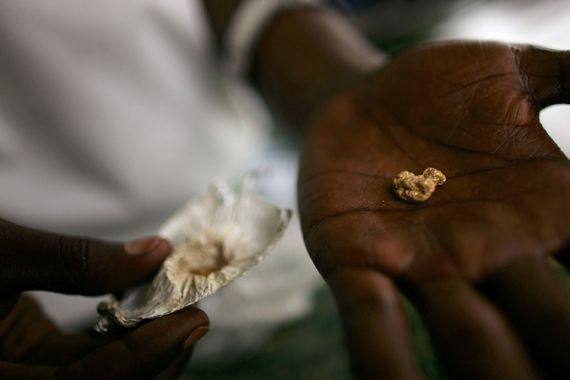
Gold: Ghana’s blessing or curse?
A look at how the precious metal impacts the lives of many Ghanaians.
By Anas Aremeyaw Anas
I always try to picture the corridors of Wall Street, the joys and heartthrobs of the world market when the price of gold goes up. Many will laugh with pleasure whenever the price of gold takes an upward turn. I then contrast this picture with the devastating effects of gold mining in some parts of Ghana, my motherland.
In the narrow and deadly corner of illegal mining, referred to as ‘galamsey’ in my country, children as young as seven-years-old are the manual hands in the mining process. Classrooms have become empty in ‘galamsey’ operation areas. Teachers and opinion leaders appear helpless at stopping this trend. ‘Galamsey’ operations come with the attraction of money on a daily basis. Though many children are exploited by their employers, kids get introduced to the world of ‘galamsey’, and once they have got extra pocket money for cinemas and new shoes, find it hard to quit.
For many others, however, it has become the only means of survival. Pregnant women sweat and labour in these pits of death. Young mothers virtually live in the deadly pits, eating, bathing and nursing their young with no choice but to withstand the dangers involved.
In the process, a generational cycle of hardship, danger and vice is being set in motion.
Gold has been a blessing to the international gold mining firms. Why is it not also a blessing to the average Ghanaian, whose land remains one of the world’s leading producers of gold? How has this precious metal made an impact on the life of the local Ghanaian, especially those who live in gold mining areas and are not able to get a job at mining firms?
Foreign businessmen come to mine gold with impunity. With the collusion of some Ghanaians, these men steal land, exploit labour, and leave Ghanaians stuck with the bill for the vast environmental problems that follow.
This was the main focus of my recent investigation into illegal gold mining in Ghana. Being the source of the raw product that turns hearts on the international market with any increase in the price of gold, it is a sad story that an entire generation in the continent of Africa is slipping through the cracks, threatened with an apocalyptic future.
On Sunday, June 27, 2010, residents of Dunkwa-on-Offin, a village in the western region of Ghana, returned from church to the tragic news of the death of over 150 of their kith and kin. These men, women, and children were trapped in a pit where they were illegally mining gold. Whole families were wiped out and many children were orphaned; lives changed forever in a single day. Only 17 dead bodies were recovered from the rubble and mud for burial, just one of many similar tragedies that continue to result from illegal mining in recent times. The death toll now stands in the many hundreds and continues to rise.
Some two decades ago, these tragedies were relatively unheard of because ‘galamsey’ was done independently by local artisans who only dug small pits manually. The ever-soaring price of gold, however, has brought many carpetbaggers into Ghana. They stay in mining communities and illegally mine gold without any thought for the consequences, and in total violation of Ghanaian law.
For example, our investigation uncovered many cases involving Chinese speculators. We discovered that in some cases they are aided by corrupt police officers, traditional chiefs, and landowners. We even heard allegations about the involvement of some key politicians in my country. In each case their assistance is obtained through the payment of bribes.
The dreadful effect of this phenomenon are clear to see: water pollution, land degradation, child labour, human trafficking, and multiple fatalities. The problem of flooding is so devastating in mining communities that the president of Ghana visited some of the affected areas and promised to intervene. Sadly, as the film shows, little has changed since then.
We also discovered that the pollution of rivers is costing the Ghanaian government millions of dollars in treatment costs. The illegal mining operators often use a Chinese-made machine, which they use to suck up the mud from river beds. This stirs up the waters and destroys aquatic life. Dead shellfish, lining the riverbanks are clear evidence of its effects.
The process uses chemicals such as mercury and cyanide, which are often then discarded into the rivers, contaminating drinking water and killing fish that are a food source for the local communities. Many people have died from the after effects, others have been left severely handicapped.
In line with my personal credo of naming, shaming and jailing, I have provided the evidence of all these things in the hope that this dreadful process will soon be corrected by the authorities.
As usual, I continue the march started by my forbearers and fellow journalists across Africa. I am particularly humbled by the support of two senior colleagues, Kweku Sakyi-Addo and Professor Audrey Gadzekpo, in pursuing this story. Our resolve to identify the perpetrators and bring them to justice remains as strong as it always has and I have vowed to help make my society cleaner for the coming generations and to the benefit of Mother Ghana’s precious resources. Stay tuned.
Watch more Africa Investigates for reports by undercover African journalists who face intimidation, beatings and death threats.
|
